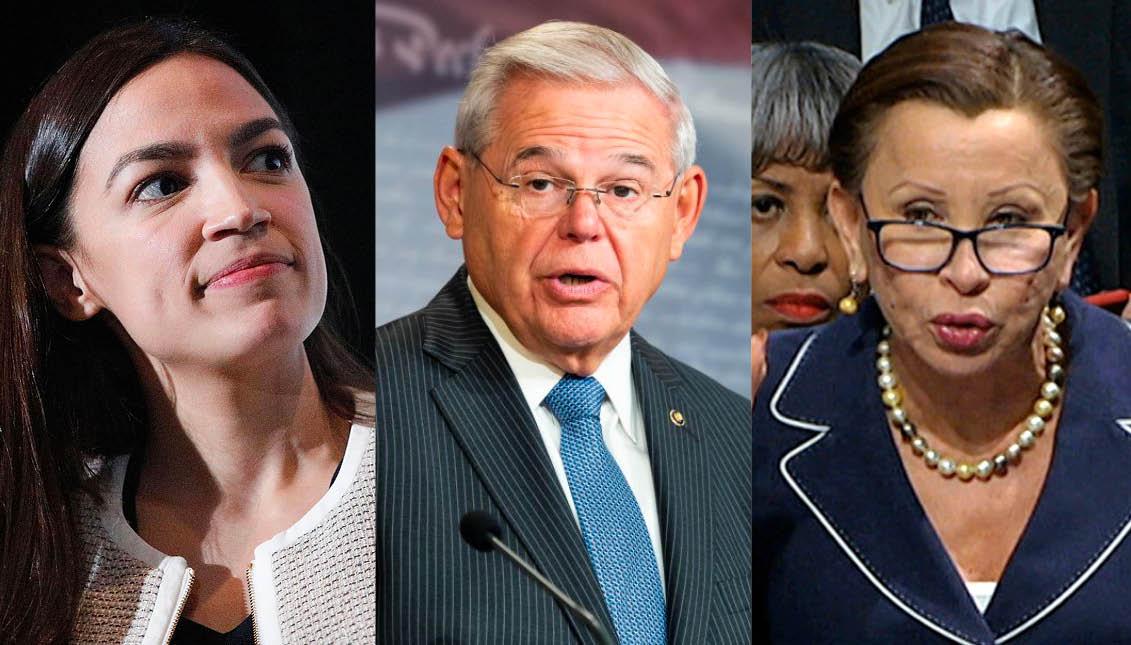
Senator Menendez makes case for Puerto Rico Self Determination by Reps. Velázquez, AOC
“I am committed to using the strength of my voice and power of my office to fight for the millions of Americans who call Puerto Rico home,” Menendez wrote.
When Representative Nydia Velázquez introduced the Puerto Rico Self-Determination Act in the 117th Congress alongside Rep. Alexandria Ocasio Cortez and Senator Bob Menendez on March 18, the bill quickly garnered over 80 co-sponsors.
It would prompt Puerto Rico’s legislature to make a status convention whose delegates would be elected by Puerto Rican voters.
So far, the case for Self-Determination has garnered powerful support from House leadership, including both the current Chair of the Hispanic Caucus, Rep. Raul Ruiz, and former Chair Rep. Joaquin Castro. Reps. Pramila Jayapal, chair of the Progressive Caucus, and Gregory Meeks, chair of the House Foreign Affairs Committee, are among the other big names backing the measure.
In the Senate, it has strong support from progressives, but the bill also has the powerful support of Sen. Menendez, the highest-ranking Latino in Congress and chairman of the Senate Foreign Relations Committee.
On April 14, The Committee on Natural Resources Office of Insular Affairs hosted a legislative hearing, presided by Rep. Raúl Grijalva, to discuss the Self Determination Act, and it’s competing bill, The Puerto Rico Statehood Admission Act, in an effort to engage Congress on Puerto Rico's future.
The issue of Puerto Rico’s status has long-divided Puerto Ricans and members of Congress in search of the most appropriate way to proceed. Most support either the New Progressive Party’s stance on statehood or the Popular Democratic Party’s support of the island’s current commonwealth, or colonial, status. A smaller portion — the Independence Party — supports Puerto Rico’s independence from the United States.
The Self-Determination Act is not explicitly against statehood. Rather, it insists that its method of having Puerto Ricans vote for their own delegates to determine their future is more democratic, rather than a simple “yes or no” vote that doesn’t outline a plan, consequences of such a plan, or who would be in charge of undertaking it.
Still, it is not without its similar set of critiques.
On the same day the hearing took place, Sen. Menendez published an op-ed in Puerto Rico’s most widely distributed newspaper, El Nuevo Día, titled “Let the People of Puerto Rico Decide Their Own Future,” where he makes the case for passing the Velázquez and Ocasio-Cortez-backed bill.
The people of PR deserve a legitimate, transparent, & democratic process to decide their political future.
— Senator Bob Menendez (@SenatorMenendez) April 14, 2021
Read my op-ed about why we must pass the Puerto Rico Self-Determination Act, which I’m leading with my colleagues Rep. @NydiaVelazquez & @RepAOC.https://t.co/d0ZFBhLz9m
“For over a century, the United States has relied on Supreme Court interpretations of our Constitution’s Territorial Clause – known as the Insular Cases – to perpetuate the unjust, exclusionary, and appalling treatment of the people of Puerto Rico. It is time for change,” Menendez writes in his op-ed.
The Insular Cases are one of the foundation’s for Menendez’s argument.
Because of them, U.S. territories like Puerto Rico were never sent on a path to statehood, meaning residents could be denied even basic constitutional rights.
At the time, the Supreme Court determined that ‘unincorporated’ hinged largely on the Court’s view of the people who lived there. The text of the Insular Cases labels such inhabitants as “half civilized,” “savage,” or “alien races.”
RELATED CONTENT
The effects go beyond the ability of citizens in the territories to vote. Despite paying billions of dollars in federal taxes, residents of U.S. territories are not eligible for Supplemental Security Income (SSI), federal programs including Medicaid, the Supplemental Nutrition Assistance Program, the child tax credit, and the Earned Income Tax Credit — these benefits or either limited or denied altogether.
“Decade after decade, our government has largely ignored the question of Puerto Rico’s political status, and the resulting ambiguity has fueled systemic inequities in the treatment of millions of American citizens who call Puerto Rico home,” Menedez’s op-ed continues.
He cites the aftermath of Hurricane Maria, and how the “uncertainty” of Puerto Rico’s status at the time, and how to respond to the crisis hindered recovery efforts and exacerbated the economic downturn. The unresolved situation made navigating the COVID-19 pandemic all the more difficult.
Menendez added that it’s situations like these that are contributing to the mass-exodus from Puerto Rico.
“The United States has a unique opportunity to address the systemic inequities resulting from its more than 100-year long colonial stranglehold over Puerto Rico. I am committed to using the strength of my voice and power of my office to fight for the millions of Americans who call Puerto Rico home and deserve to forge their own political destiny,” he wrote.
Those pushing statehood, including Puerto Rican U.S. Reps. Darren Soto, Ritchie Torres, and Commissioner Jenniffer González have strengthened the statehood effort this year in particular, arguing that the presence of colonialism, a big point for the Self-Determination backers, is present in the available options. However for them, statehood is the most beneficial route.
Puerto Rico held a non-binding referendum last November, where Puerto Ricans declared their desire for statehood, in a vote where only 55% of registered voters participated in the referendum. Of those, the narrow vote resulted in 52% support and 47% against.
The referendum — a yes or no vote on statehood — was not binding. And like Velazquez’s bill, it does not include a transition plan, though it does narrow-down the options to proceed.
To statehood backers, the people of Puerto Rico have spoken, and the next steps to make it happen should be considered.
While the case for self-determination is strong, neither bill appeared to gain the upper hand of the other at the end of the hearing on Wednesday.











LEAVE A COMMENT: